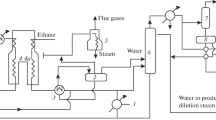Conclusions
For a correct valuation of savings in converting cat cracking units to highly active zeolite-containing catalysts with the aim of increasing the gasoline yields, it is desirable to reexamine the current procedure for costing petroleum products and to consider the target products in cat cracking to be only the gasoline and the light ends, whether the unit is operating in the fuel regime or in the petrochemical regime.
The diesel fraction (fuel variant) or the 270–420°C (petrochemical variant) used as a source of carbon black feedstock should be considered as a byproduct, valued at the cost of original feedstock for the cat cracking process.
In the extraction process, the target products should be considered to be the feedstock for carbon black production (extract) and the 270–420°C diesel fraction (raffinate).
Similar content being viewed by others
Author information
Authors and Affiliations
Additional information
Translated from Khimiya i Tekhnologiya Topliv i Masel, No. 7, pp. 26–29, July, 1973.
Rights and permissions
About this article
Cite this article
Feigen, S.A., Erkina, L.I. & Straumé, M.K. Cost calculation methods for petroleum products in catalytic cracking. Chem Technol Fuels Oils 9, 526–528 (1973). https://doi.org/10.1007/BF00724943
Issue Date:
DOI: https://doi.org/10.1007/BF00724943




